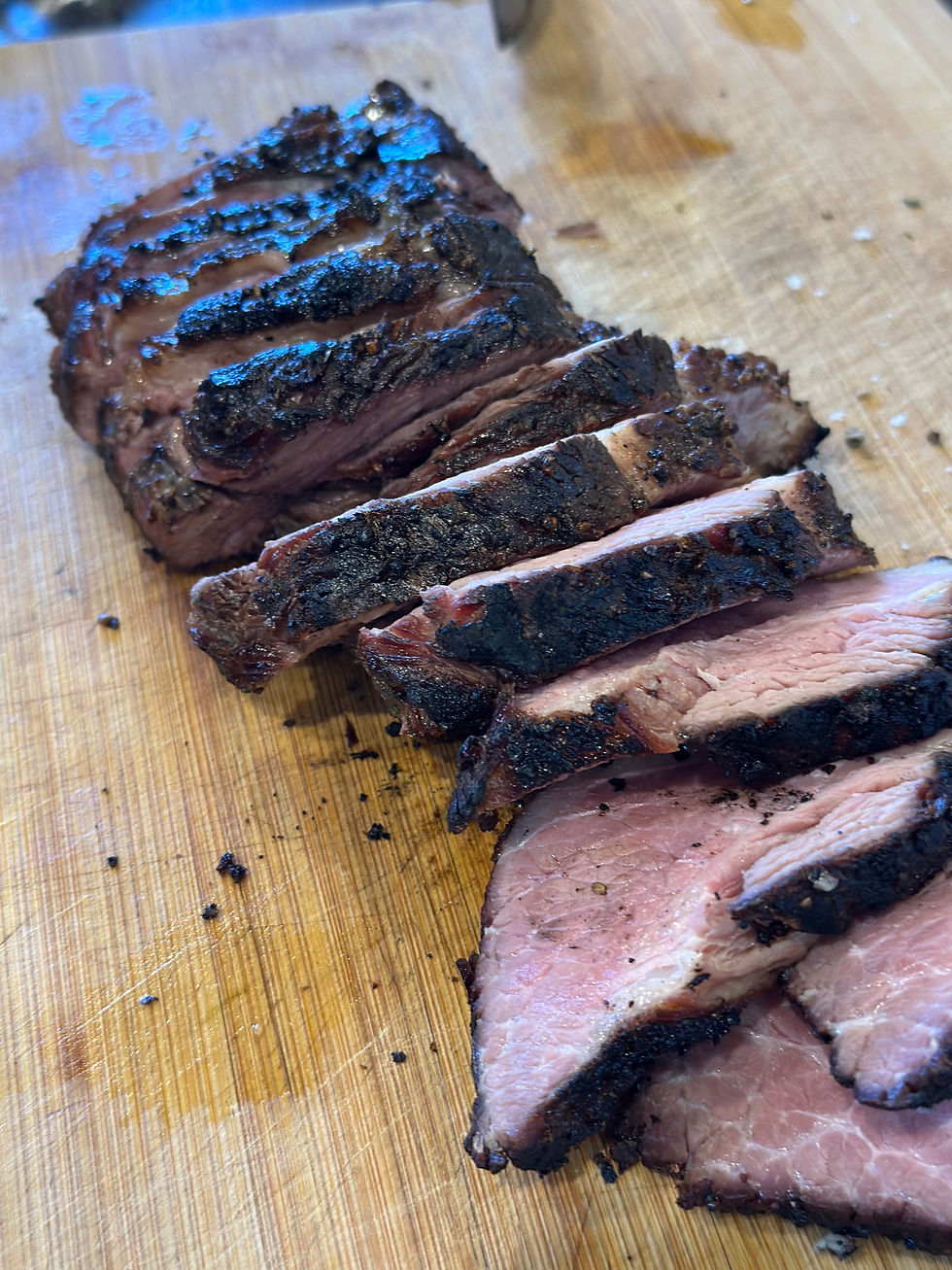Mastering Time in Cooking: The Secret to Exceptional Meat
- adele871
- Sep 1, 2025
- 4 min read
In a world full of timers, air fryers and recipe apps, it’s easy to forget that the best meat is cooked with patience - not pressure. Whether you're grilling ribeye, roasting a leg of lamb or simmering a stew, the real game-changer isn’t just technique. It’s time.
Time transforms tough into tender, bland into flavourful and ordinary into unforgettable. In this post, we’ll unpack the time-based techniques that make the biggest difference and how you can apply them at home.
It’s Not Just About Timers
We’ve all followed recipes to the letter and still ended up with dry meat or uneven cooking. That’s because time in cooking isn’t only about minutes and degrees - it’s about paying attention.
Meat tells you when it's ready. Sizzling sounds change when moisture is driven off. Aromas shift from raw to rich. A perfect crust forms when proteins caramelise, not just when the clock ticks.
Learning to trust your senses - sight, smell, touch and even sound - makes all the difference.
Dry Brining: Let the Salt Work While You Sleep
Dry brining is one of the most underrated ways to improve meat. It’s simple: just salt your meat in advance and let it rest in the fridge.
When salt is applied early, it pulls moisture to the surface, dissolves, then gets reabsorbed - carrying flavour deep into the meat. It also breaks down muscle structure, leading to a more tender bite.
Recommended timing:
Steaks and roasts: 24 - 48 hours
Chicken or pork: 12 - 24 hours
Fish or seafood: 30 minutes to 1 hour
Make sure to leave the meat uncovered in the fridge on a wire rack over a tray. This helps the surface dry slightly, which gives you that golden-brown crust during cooking.
Food Safety Tip: Always store raw meat on the bottom shelf of the fridge to prevent drips from contaminating other foods. Keep it in a clean tray or container to catch any juices and make sure nothing can spill onto it from above.
It’s a small investment of time and care that pays off with better flavour and safer food.
Low and Slow: Why Rushing Ruins Flavour
Some cuts demand slow cooking. Brisket, chuck, lamb shoulder, osso buco - these tougher pieces are full of connective tissue that need time to break down.
When cooked slowly (either in a smoker, slow cooker, sous vide or covered in the oven), collagen transforms into gelatin, giving the meat that luscious, fall-apart texture and deep, beefy flavour.
Here’s how we do it with brisket:
We season our brisket simply with salt - you can add other flavours too, just don’t go overboard as the long cook intensifies everything. Then we vacuum-seal it in a sous vide bag and cook it at 58°C for 72 hours. Yes, three full days. The result is incredibly tender meat with a deep, rich flavour.
You can actually buy it already cooked like this from us. All you need to do is:
Defrost it in the fridge for 2-3 days before you need it
Heat up your BBQ
Season it again (we like a light dusting of our red wine salt and pepper)
Cook it until it’s hot throughout and develops a nice bark
It’s an easy way to serve something truly impressive with almost no prep - perfect for weekends, events or when you want to feed a crowd without fuss.
Don’t just “cook until it’s done”- let it cook until it’s right.

Resting Isn’t Optional
Once you’ve nailed the cook, don’t ruin it by cutting too soon.
Resting meat after cooking gives time for the juices to redistribute. If you slice too early, all that moisture ends up on the cutting board.
General guide:
Steaks and chops: 5 to 10 minutes
Whole roasts: 15 to 20 minutes
BBQ cuts like brisket: 30 minutes or more, wrapped in foil
Just loosely tent with foil and leave it alone. It makes a huge difference to flavour and juiciness.
Cook with Confidence, Not Just Instructions
The more you cook, the more you’ll realise that recipes are guidelines - not gospel. If a steak looks grey and pale after 4 minutes, it’s not ready to flip - even if the recipe says so.
Be present. Listen to the sizzle. Smell the change. Watch how the surface reacts. These cues tell you what timers can’t.
And don’t forget - time includes planning. Cooking meat well often means starting the day before, giving your salt time to work or letting a stew go low and slow while you’re out in the paddock.
Time Is the Unsung Hero
The secret to exceptional meat isn’t always in what you do - it’s in when you do it. Give salt time to do its magic. Give heat time to tenderise. Give your meat time to rest.
You’ll be amazed at the difference these small shifts make. Be sure to share with us your delicious creations. Tag us on socials. We would love to see how you prepare and enjoy our meat.



Comments